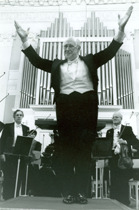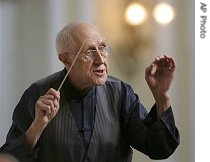2007年VOA标准英语-Remembering Mstislav Rostropovich(在线收听)
Washington
02 May 2007
Internationally renowned cellist and conductor, Mstislav Rostropovich, died Friday, April 27 in Moscow at age 80. The great cellist spent much of his life in the United States after he was formally exiled from his native Russia in 1978. VOA's John Stevenson recalls the life of the musician critics called the "Pablo Casals" of his generation.
 |
| Matislav Rostropovich |
The young cellist launched his professional musical career during the summer of 1940, but World War II interrupted his plans. He found himself supporting the war effort by performing in hospitals and before military units. After the war, he returned to studying the cello and performing with chamber groups in Moscow. As a performer, Rostropovich's fame spread rapidly. He attracted international attention as a soloist with the Moscow Philharmonic. By 1950, he had won first prize three times in cello competitions in Prague and Budapest. Within five years he made his debut in New York's Carnegie Hall.
Soon, the Soviets granted their prize musician the right to perform frequently in the West. Rostropovich played in European capitals and made frequent appearances as a guest artist at the Russian Embassy in Washington, D.C.
In 1968, When Warsaw Pact troops invaded Czechoslovakia, Rostropovich was on tour in London. He played Antonin Dvorak's concerto and left the stage in tears.
Two years later, he antagonized soviet officials and jeopardized his career by protesting The Kremlin's treatment of his friend, Nobel Prize author Alexander Solzhenitsyn, whom Rostropovich sheltered in his home outside Moscow. He spoke against intimidation of artists, and for that, the Soviet government imposed a three-year travel ban on the prominent cellist and his family. When the ban was lifted, in 1974, Rostropovich left for the West.
"I was like a newborn child. I had no money, no home, and I did not know how long I would stay at that time," he said. "I had permission from the Soviet government to live outside of Russia for two years." Rostropovich continued his career in the West, conducting as well as playing the cello. After staying abroad for more than four years, The Kremlin revoked his citizenship. By then, he was firmly established as conductor of the Washington National Symphony Orchestra.
The list of composers who have written specifically for the celebrated cellist include Benjamin Britten, Dmitri Shostakovich and Sergei Prokofiev, who wrote the "Sinfonia Concertante For Cello, Opus 125."
 |
| Mstislav Rostropovich conducts The Grand Symphonic Orchestra during a rehearsal of a concert of music at Moscow's Conservatory, 22 Sept 2006 |
In 1989, as the Berlin Wall was being torn down, Rostropovich was there playing Bach cello suites. A year later, his Russian citizenship was restored, and he returned to his homeland to perform with the National Symphony Orchestra.
When hardline communists attempted to overthrow then-President Mikhail Gorbachev in 1991, Rostropovich rushed to Moscow, spending several days in the Russian parliament protesting the attempted coup. Later that year, he and his wife, soprano Galina Vishnevskaya established the Vishnevskaya-Rostropovich Foundation seeking to improve health care for children in former Soviet countries.
Among the awards bestowed on Rostropovich were the U.S. Presidential Medal of Freedom and a knighthood conferred on him by Queen Elizabeth II, both in 1987.
After stepping down as the National Symphony's music director in 1994, he was named the Orchestra's Conductor Laureate. He also maintained close ties with the London Symphony Orchestra, the New York Philharmonic, the Philadelphia Orchestra and other great orchestras. Last year, Rostropovich announced he would stop playing the cello publicly. He maintained a vigorous conducting schedule, however.
Rostropovich was hospitalized in Paris with cancer in January. He made a final return to Moscow, where had been in and out of medical facilities since February, even though he was able to attend his 80th birthday celebration on March 27 where Russian President Vladimir Putin presented him with a medal: the Order of Service to the Fatherland. Rostropovich is survived by his wife and two daughters.
Virtuoso cellist and world-renowned conductor Mstislav Rostropovich dead at age 80.